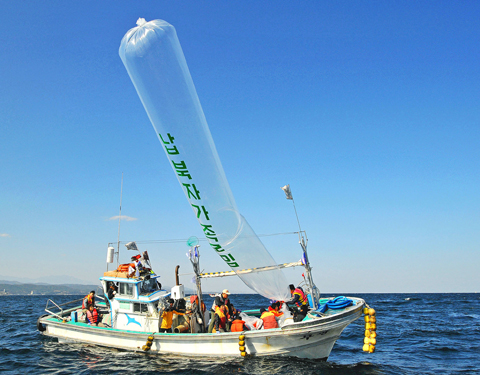North and South Korea held military talks yesterday despite worsening relations as South Korean activists floated propaganda leaflets into the communist state.
The meeting, inside the Demilitarized Zone, which divides the Korean peninsula, was aimed at improving military hotlines between the two nations, the South’s defense ministry said.
“Talks ended before noon. We will disclose the outcome of the meeting later,” a ministry spokesman said.

PHOTO: AFP
The two Koreas, which have remained technically at war since their 1950 to 1953 conflict ended in an armistice, have nine military hotlines, one of which is out of service because of technical problems.
North Korea has cut off almost all official contacts with the South since conservative South Korean President Lee Myung-bak took office in February and adopted a firmer stance in cross-border relations.
Military talks were held on Oct. 2 but ended without agreement.
The North at that meeting threatened to evict all South Koreans from a joint industrial estate at Kaesong in the North unless Seoul stopped defector groups and activists spreading the leaflets.
The two sides agreed to stop government-level propaganda after their first summit in 2000. But private groups have continued, despite pleas from the Seoul government and from businesses operating in Kaesong.
Eight activists and defectors floated about 40,000 leaflets by balloon into the North yesterday from a boat near the eastern sea border, shouting “Down with [North Korean leader] Kim Jong-il!”
The leaflets contained messages urging North Koreans to rise up against Kim, describing him as a “murderous” dictator. They repeated claims that Kim suffers from paralysis following a reported stroke in August.
“Kim Jong-il is the most wicked dictator in the world. You should stage a struggle to overthrow his military dictatorship,” a typical leaflet read.
Choi Sung-young, an activist trying to locate South Koreans abducted by Pyongyang during the Cold War, said his group released four large balloons loaded with the leaflets as well as with US and Chinese currency.
“We will float another 60,000 leaflets later in the day from a location west of Seoul,” Choi said by phone.
He said about 30 plastic bottles containing rice were also released into the sea. “We hope the tidal current will bring rice bottles to our hungry brothers in the North.”
Some leaflets contained a detailed list of South Korean abductees held in the North, he said.
By South Korean count 494 citizens, many of them fishermen, were seized in the decades following the Korean War. In addition, Seoul says more than 500 of its prisoners of war were never sent home.

In the sweltering streets of Jakarta, buskers carry towering, hollow puppets and pass around a bucket for donations. Now, they fear becoming outlaws. City authorities said they would crack down on use of the sacred ondel-ondel puppets, which can stand as tall as a truck, and they are drafting legislation to remove what they view as a street nuisance. Performances featuring the puppets — originally used by Jakarta’s Betawi people to ward off evil spirits — would be allowed only at set events. The ban could leave many ondel-ondel buskers in Jakarta jobless. “I am confused and anxious. I fear getting raided or even

POLITICAL PATRIARCHS: Recent clashes between Thailand and Cambodia are driven by an escalating feud between rival political families, analysts say The dispute over Thailand and Cambodia’s contested border, which dates back more than a century to disagreements over colonial-era maps, has broken into conflict before. However, the most recent clashes, which erupted on Thursday, have been fueled by another factor: a bitter feud between two powerful political patriarchs. Cambodian Senate President and former prime minister Hun Sen, 72, and former Thai prime minister Thaksin Shinawatra, 76, were once such close friends that they reportedly called one another brothers. Hun Sen has, over the years, supported Thaksin’s family during their long-running power struggle with Thailand’s military. Thaksin and his sister Yingluck stayed

Kemal Ozdemir looked up at the bare peaks of Mount Cilo in Turkey’s Kurdish majority southeast. “There were glaciers 10 years ago,” he recalled under a cloudless sky. A mountain guide for 15 years, Ozdemir then turned toward the torrent carrying dozens of blocks of ice below a slope covered with grass and rocks — a sign of glacier loss being exacerbated by global warming. “You can see that there are quite a few pieces of glacier in the water right now ... the reason why the waterfalls flow lushly actually shows us how fast the ice is melting,” he said.

RESTRUCTURE: Myanmar’s military has ended emergency rule and announced plans for elections in December, but critics said the move aims to entrench junta control Myanmar’s military government announced on Thursday that it was ending the state of emergency declared after it seized power in 2021 and would restructure administrative bodies to prepare for the new election at the end of the year. However, the polls planned for an unspecified date in December face serious obstacles, including a civil war raging over most of the country and pledges by opponents of the military rule to derail the election because they believe it can be neither free nor fair. Under the restructuring, Myanmar’s junta chief Min Aung Hlaing is giving up two posts, but would stay at the